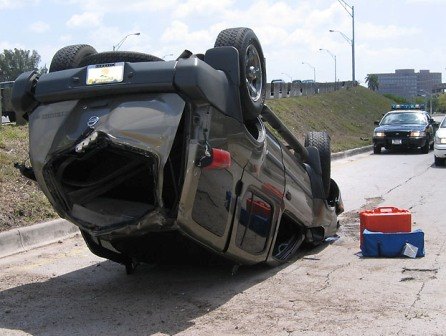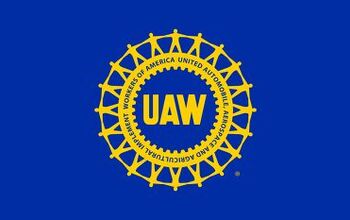Detroit To DC: Rollover Safety Or CAFE?
Automotive News [sub] dutifully reports that the auto industry's lobbying group are arguing that proposals to strengthen vehicle roofs conflict with recently-increased CAFE standards. [ Never mind the fact that heavier lids are dubious from a safety point of view.] In testimony before the Senate, the Alliance of Automobile Manufacturers' shills argued that roof-strengthening measure sought by safety advocates could hurt the fuel economy of large pickups and SUVs by up to ten percent. But since CAFE increases (along with those crazy gas prices) basically herald the demise of mainstream "large pickup and SUV" ownership, it seems that the AAM is barking up the wrong tree. Meanwhile, lawmakers are playing-up to telegenic emotional outbursts from "victims" of "heartless car companies" during their public hearings. While all of us know someone who's been killed or seriously injured in a car accident, automotive regulations should be based on proper scientific analysis of the full implications of existing and proposed regulations– research into which the National Highway Traffic Safety Administration excels. Those who criticize NHTSA's new roof crush standards– requiring roofs to support 2.5 times the vehicle's weight (up from the current 1.5 times)– should consider the possibility that not all government agencies work against the public interest. Besides, if this is such a serious problem, why are convertibles still exempt from ALL roof crush standards?
More by Edward Niedermeyer


































Comments
Join the conversation
The IIHS requirement of ESC on a vehicle to get its highest rating is their attempt to address this very issue -- using the existing technology to prevent the rollover in the first place. Of course, they'll still happen, so it's a 'stopgap' measure until gov't and automakers can get their act together.
Wheatridger : In case you stop back by here, your technical points all well taken, also the bit about potentially 50 different state standards. But: 1) Independent organizations, whether something like the SAE or UL, or even Consumer Reports, can do testing and rate safety of autos. 2) ONE state may decide to regulate, and so set a standard, so that once a vehicle meets that standard, it can be advertised as such as a selling point. Baked goods for decades have borne the label, "REG. PENNA. DEPT. AGR." meaning that Pennsylvania inspects the company's plant, operations for cleanliness, etc. Given mass-production efficiencies, this could even be a foreign government, like the 'CE' designation on the bottom of your pocket calculator, indicating that it meets EU standards. 3) If, despite all this, U.S. Government regulation seems not only overwhelmingly compelling, but unavoidable, fine: but so amend the Constitution first.
I'm not sure anyone is better off if, say, it's France or North Dakota who sets the safety standards. Their politicians aren't answerable to me or to you. And though a constitutional lawyer could say it better, there's a long, firm legal precedent for Washington to regulate "interstate commerce," and auto manufacturing certainly meets that category. I'm not crazy about "big government," but in an age of multinational, megabillion-dollar corporations, it just takes a big public entity to watch over them, IMHO.
Wheatridger : Sorely tempted to let you have the last word, on account of your intelligence and dignity, but here goes anyway: "I’m not sure anyone is better off if, say, it’s France or North Dakota who sets the safety standards." It might be a lot worse. I wasn't looking at whether we would be 'better off' under my proposed scheme of regulation. I was confining my comments to what is Constitutional. We can't have the U.S. Government--thousands upon thousands of armed men, women--sweeping down upon people's homes, farms, businesses without their actions having been authorized by the Constitution. "there’s a long, firm legal precedent for Washington to regulate “interstate commerce,” (1) Yes, the Government can regulate interstate commerce. It doesn't say they should. (2) much of the Supreme Court's holding, the precedents you mention, on these cases has been not only wrong, but deliberately wrong, in the interest of building up big government. Check out: http://en.wikipedia.org/wiki/Wickard_v._Filburn especially this part: --- "The Court's decision" "The intended rationale of the Agricultural Adjustment Act is to stabilize the price of wheat on the national market...Filburn argued that since the excess wheat he produced was intended solely for home consumption it could not be regulated through the interstate commerce clause. "The Supreme Court rejected this argument reasoning that if Filburn had not used home-grown wheat, he would have had to buy wheat on the open market. "This effect on interstate commerce, the Court reasoned, may not be substantial from the actions of Filburn alone but through the cumulative actions of thousands of other farmers just like Filburn its effect would certainly become substantial. "Therefore Congress could regulate wholly intrastate, non-commercial activity if such activity, viewed in the aggregate, would have a substantial effect on interstate commerce, even if the individual effects are trivial." --- If the Interstate Commerce Clause means they can keep you from growing not marijuana, but wheat, on your own land, for your own consumption, than it can mean anything. And 'anything' is not what the Founders gave their lives, their fortunes, their sacred honor for. Check out: http://www.amazon.com/Dirty-Dozen-Radically-Expanded-Government/dp/1595230505 "in an age of multinational, megabillion-dollar corporations, it just takes a big public entity to watch over them" Sure, a public entity is needed, at Federal, State, City and County levels. Only they must follow the Constitution.